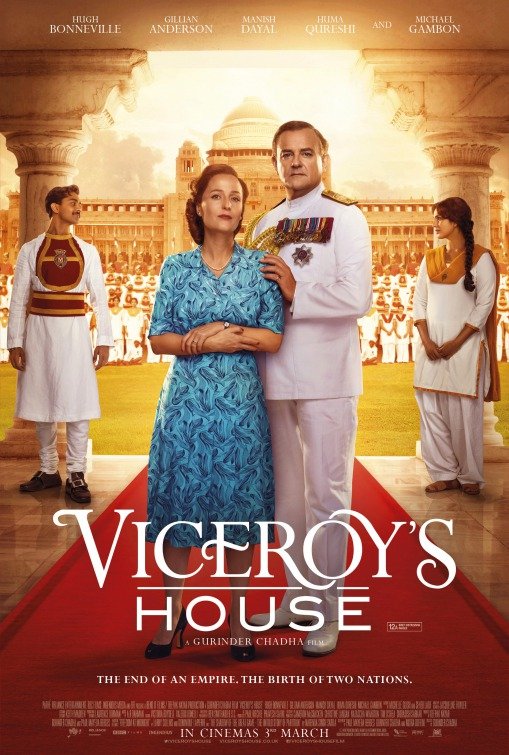“Illusive Victory”

| None | Light | Moderate | Heavy | |
|---|---|---|---|---|
| Language | ||||
| Violence | ||||
| Sex | ||||
| Nudity |
What You Need To Know:
Though well-made and engaging, the multiple story lines in VICEROY’S HOUSE slow things down. The movie’s depiction of personal suffering and love are evident and deeply touching. The comprehensive care and concern Lord Mountbatten and his family show for the Indian people is uplifting and inspiring. Also, the movie extols love and peace. However, VICEROY’S HOUSE has strong politically correct elements, including some revisionist history that’s too negative toward Britain and too positive toward Gandhi. There’s also some disturbing violence. So, MOVIEGUIDE® advises extreme caution for VICEROY’S HOUSE.
Content:
Light moral worldview promoting peace and love about India’s independence and the creation of Pakistan in 1947, but with some politically correct revisionist history where Gandhi’s quirky, destructive views are not mentioned and neither are the positive contributions Britain made to India through the centuries (Britain is unfairly blamed at one point for the divisions in India that occurred over the 1947 independence and the creation of Pakistan), with some pagan elements such as Gandhi falsely says all religions are the same path to God, but he also says some positive redemptive things including that it isn’t God’s will that the people of India should divide over religion, that we are all brothers and sisters, and that love is the most powerful force in the world and is too often left out of politics (and there are references to Islam and Hinduism, the two main religions in India), plus there is a comment in favor of socialism.
Three or four “h” words.
Brief strong and some light violence includes several “news clips” are shown of the violence and death caused by fighting between Hindus, Muslims and Sikhs in India, children and babies are shown lying dead in the street, refugees are shown to be sick and starving to death as they migrate to their newly designated homeland after parts of India are divided to create Pakistan, woman has wounds from being thrown off a train.
No sex but there’s one marital relationship and one romantic relationship that is heartfelt and chaste.
Upper male nudity in a few scenes of Gandhi.
No alcohol use.
No smoking or drugs.
Religious conflicts but they are rebuked.
More Detail:
Lord Louis and Lady Edwina Mountbatten are commissioned by the British Empire to ensure India’s successful transition from British rule to independence. The British couple live on the upper floor of a palace with their daughter, Pammy. The lower floor houses the 500 member Indian staff, who are there to serve them. Upon arrival, they immediately begin to realize the gravity of the situation for the people of India. As their independence is on the horizon in India, Hindus, Muslims and Sikhs are on the verge of civil war, in a bid for power. Lord Mountbatten desperately strives to keep India united. With mounting pressure from leading Sikhs, Hindus and Muslims, Mountbatten agrees to the creation of a separate state of Pakistan for Muslims, in an attempt to avert civil war.
VICEROY’S HOUSE has a DOWNTON ABBEY feel to it. As a great deal of history is unraveled, there’s plenty of “class” drama intertwined throughout. In the backdrop is an unfolding love story between Jeet and Aalia, a Hindu man and a Muslim woman. With an impossible future, the young couple in love is faced with the reality of a heart wrenching goodbye. Their love and devotion in their respectful, pure relationship, breaks down the politics to show the humanity of the situation.
The Viceroy and his family grapple with the toll that the chaos in India is taking on their personal lives. Lady Edwina is committed to helping the poor. She’s deeply troubled when she discovers a 1 out of 5 infant mortality rate and a 90% illiteracy rate. She’s also a supportive partner to her husband, as she works tirelessly to mitigate people’s suffering in India. Lady Edwina is committed to the people and strongly advises her husband in the political matter of keeping India united. However, she shows a greater commitment to her husband when she gives him support, even though she disagrees with his resolution to divide India.
However, the demands of their government assignment leave their daughter, Pammy, feeling neglected. At one point, Pammy tells a friend her mother claims she “never knew who she was until she started working.” Pammy concedes her mother doesn’t have time for her. The Viceroy does not seem to have a lot of time for his daughter either, as he insists that she keep a stiff upper lip and hold back her emotions. Despite their personal struggles, the family works together to meet the needs of the Indian people.
The main proponents of the new state of Pakistan are Muhammed Ali Jinnah and Jawaharlal Nehru. Jinnah insists that Muslims won’t be treated equally if they don’t have a separate state. Nehru insists there will be unprecedented bloodshed if Muslims don’t have their own state. Both men have something to gain personally. Thus, the movie shows Jawaharlal becomes the first Prime Minister of India while Jinnah becomes the Founder and Governor-General of Pakistan. As violence increases and all of India is divided, Lord Mountbatten acquiesces to the creation of a new state. Recognizing the insurmountable chaos that could quickly escalate into civil war, Mountbatten moves the timeline for the creation of a new state and the subsequent migration up to a few months.
With the creation of Pakistan comes the largest migration in history. An estimated 14 million Indian people are separated based on their religion. The harsh conditions of the resettlement process still ends up costing one million people their lives. The resettlement is mainly shown through black and white news clips, so it comes across as rushed and choppy.
Mountbatten discovers that the plan to divide India was put into place by Winston Churchill years before 1947. The motive behind British interest in dividing India is briefly described as an attempt at securing control of the ports, in an effort to keep the Soviet dictatorship of Stalin out of India. Feeling like a pawn, Mountbatten shows disgust for the role he plays in history, as he points out that there are no winners. Feeling responsible to help the Indian people in the transition, Lord Mountbatten and his family reside in India after their civil duties are completed. Sadly, Mountbatten and his grandson, Nicholas, were later brutally assassinated by the Irish Republican Army (IRA) in 1979.
VICEROY’S HOUSE is a heartfelt, well produced historical drama, but too many storylines slow down the movie a little. Some repetitive scenes of the hostile relationships between Hindus, Sikhs and Muslims also slow down the story. The mass migration is rushed. In addition, using black and white “news clips” instead of drama to show the troubled migration of Muslims and Hindus distracts from the story.
When it comes to Mountbatten and his family, VICEROY’S HOUSE is a fairly balanced account of the transition in India from British rule to independence. However, the movie leaves out the short-sighted and quirky views of Gandhi, which are revealed in books like Paul Johnson’s masterpiece about the 20th Century, MODERN TIMES: THE WORLD FROM THE TWENTIES TO THE NINETIES, which shows how Gandhi’s support for independence inevitably led to the death of one million people. It also leaves out all the contributions the British made to India entirely. In fact, a statement is made that places the blame entirely on Britain, with the claim that the division of India is a result of the British government’s alleged “divide and rule policy.” It is hard to show, however, that the division is also caused, at least in part, by the deep-seated religious and cultural differences among Hindus, Sikhs and Muslims. Thus, VICEROY’S HOUSE is plagued by some politically correct revisionist history.
In the book THE MAKING OF INDIA, Dr. Katar Lalrani, an Indian man, claims shows Britain did a lot of good in India. Although controversial, Lalrani’s view is supported by the improvements made over the previous few centuries of British rule, in infrastructure, democratic government, fresh drinking water and introducing India to tea, which made India the world’s largest producer of tea. As a result, India is the world’s largest democracy.
VICEROY’S HOUSE doesn’t totally attack Britain, but there is a consistent attitude in the dialogue throughout the movie that the Indian people couldn’t wait for Britain to leave them to their independence. So, Movieguide® advises extreme caution regarding VICEROY’S HOUSE regarding its worldview flaws and for some disturbing violence. Overall, however, it’s an intelligent, heartfelt historical movie, with some drama to keep it interesting and a positive message supporting peace and love.


 - Content:
- Content: 




